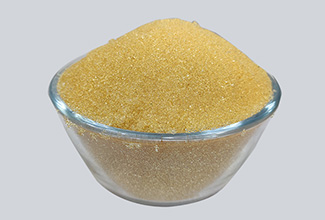Macroporous Gold-Extraction Resin in the Hydrometallurgy Industry
1. Introduction
Hydrometallurgy is an essential technology in modern metal smelting, widely used for the extraction and recovery of precious metals. As resources become increasingly scarce and environmental regulations tighten, finding efficient and economical methods for metal extraction has become a significant challenge in the industry. Among various technologies, ion exchange has gradually emerged as a mainstream method due to its high selectivity and efficiency. D301G macroporous gold-extraction resin, as an important ion exchange material, is widely applied in the extraction of precious metals due to its excellent performance.
2. Characteristics and Composition of D301G Resin
D301G resin is a macroporous ion exchange resin primarily composed of a polystyrene matrix and functional groups. Its main characteristics include:
1. Large Pore Size: D301G resin features a larger pore size, effectively adsorbing larger metal ions and increasing the surface area of the resin.
2. Strong Selectivity: This resin exhibits a strong selectivity for precious metal ions such as gold and silver, enabling effective separation from other impurity metals.
3. Corrosion Resistance: The resin demonstrates good resistance to various chemical reagents, making it versatile.
4. Regeneration Capability: The resin can be chemically regenerated and reused, reducing operational costs.
4. Specific Application Cases
1. Treatment of Gold Ore Leachate
In the cyanide leaching process of gold mines, leachate rich in gold ions is typically generated. D301G resin can efficiently adsorb gold ions even at low cyanide concentrations and low pH levels. In practical applications, by adjusting the flow rate of the leachate and the resin filling amount, the recovery rate of gold can be significantly improved.
2. Recovery of Precious Metals from Wastewater
Many smelting processes produce wastewater containing metal ions. D301G resin can effectively remove metal pollutants from wastewater. In certain factories, the application of D301G resin has led to a significant reduction in the concentration of gold and silver ions in wastewater, achieving both resource recovery and environmental protection goals.
3. Recovery of By-Products from Smelting
During the smelting of copper, lead, and other metals, by-products often contain precious metals. After leaching treatment, these by-products can be effectively processed to extract gold, silver, and other precious metals using D301G resin, thereby enhancing economic benefits and resource utilization efficiency.
Hydrometallurgy is an essential technology in modern metal smelting, widely used for the extraction and recovery of precious metals. As resources become increasingly scarce and environmental regulations tighten, finding efficient and economical methods for metal extraction has become a significant challenge in the industry. Among various technologies, ion exchange has gradually emerged as a mainstream method due to its high selectivity and efficiency. D301G macroporous gold-extraction resin, as an important ion exchange material, is widely applied in the extraction of precious metals due to its excellent performance.
2. Characteristics and Composition of D301G Resin
D301G resin is a macroporous ion exchange resin primarily composed of a polystyrene matrix and functional groups. Its main characteristics include:
1. Large Pore Size: D301G resin features a larger pore size, effectively adsorbing larger metal ions and increasing the surface area of the resin.
2. Strong Selectivity: This resin exhibits a strong selectivity for precious metal ions such as gold and silver, enabling effective separation from other impurity metals.
3. Corrosion Resistance: The resin demonstrates good resistance to various chemical reagents, making it versatile.
4. Regeneration Capability: The resin can be chemically regenerated and reused, reducing operational costs.
4. Specific Application Cases
1. Treatment of Gold Ore Leachate
In the cyanide leaching process of gold mines, leachate rich in gold ions is typically generated. D301G resin can efficiently adsorb gold ions even at low cyanide concentrations and low pH levels. In practical applications, by adjusting the flow rate of the leachate and the resin filling amount, the recovery rate of gold can be significantly improved.
2. Recovery of Precious Metals from Wastewater
Many smelting processes produce wastewater containing metal ions. D301G resin can effectively remove metal pollutants from wastewater. In certain factories, the application of D301G resin has led to a significant reduction in the concentration of gold and silver ions in wastewater, achieving both resource recovery and environmental protection goals.
3. Recovery of By-Products from Smelting
During the smelting of copper, lead, and other metals, by-products often contain precious metals. After leaching treatment, these by-products can be effectively processed to extract gold, silver, and other precious metals using D301G resin, thereby enhancing economic benefits and resource utilization efficiency.
Last One :
Related Products
-
.png) Cation Polyacrylamide ResinPurity : 99.9%Color : off-whiteQuality Control : Each Lot of Cationic Polyacrylamide was tested successfully
Cation Polyacrylamide ResinPurity : 99.9%Color : off-whiteQuality Control : Each Lot of Cationic Polyacrylamide was tested successfully -
.jpg) Super Absorbent Polymer SAP for AgriculturalMain ngredient:Potassium PolyacrylatePhysical Property:Non-toxic,NonpollutingFunction:Drought control /Saving water /Soil conditioner
Super Absorbent Polymer SAP for AgriculturalMain ngredient:Potassium PolyacrylatePhysical Property:Non-toxic,NonpollutingFunction:Drought control /Saving water /Soil conditioner -
 001X8 water softener ion exchange ResinIonic form:Na+Appearance: Claybank to tan transparent spherical particle.The degree of crosslinking : 8%.
001X8 water softener ion exchange ResinIonic form:Na+Appearance: Claybank to tan transparent spherical particle.The degree of crosslinking : 8%.
Message

